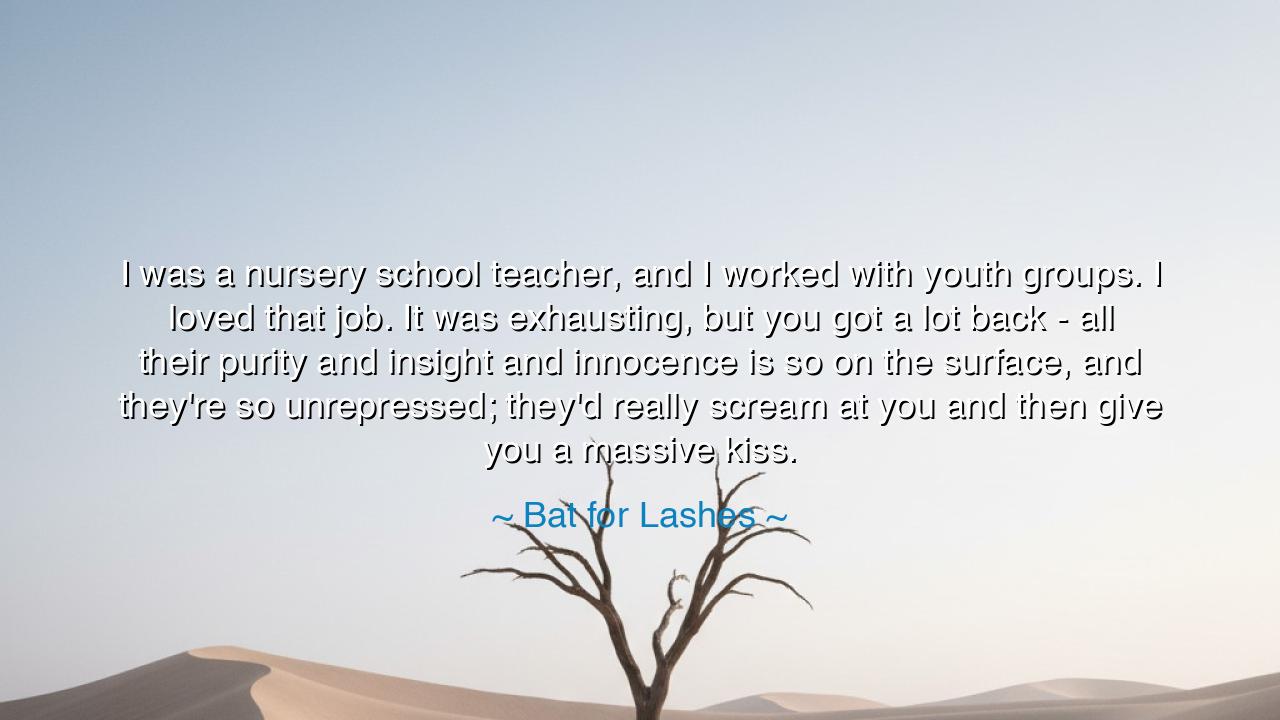
I was a nursery school teacher, and I worked with youth groups.
I was a nursery school teacher, and I worked with youth groups. I loved that job. It was exhausting, but you got a lot back - all their purity and insight and innocence is so on the surface, and they're so unrepressed; they'd really scream at you and then give you a massive kiss.






Bat for Lashes, the singer and artist, once revealed a truth that is both tender and eternal: “I was a nursery school teacher, and I worked with youth groups. I loved that job. It was exhausting, but you got a lot back — all their purity and insight and innocence is so on the surface, and they're so unrepressed; they'd really scream at you and then give you a massive kiss.” Within these words shines a reflection not only on teaching, but on the raw and unguarded spirit of children, whose lives remind us of the essence of being human before the world layers us with pretense and restraint.
The meaning of her words lies in the balance of exhaustion and reward. To guide children is no simple task: their energy is unbounded, their emotions untamed, their demands relentless. Yet, within that storm of energy lies a hidden treasure — the unfiltered love, the pure affection, and the flashes of truth that only children can reveal. In their laughter, their anger, their tears, and their sudden embraces, the teacher is reminded of the elemental forces of life: that honesty, when pure, can wound, but it also heals with the swiftness of a kiss.
The origin of this insight rests in the ancient reverence for childhood. Philosophers like Rousseau wrote that children are born innocent, corrupted only by society. The ancients, too, often revered youth as close to the divine, believing that in their purity they reflected truths that adults had forgotten. Bat for Lashes, speaking from her lived experience, affirms this old wisdom: that to be among children is to be constantly reminded of innocence, of life before masks, of truth before compromise.
History gives us examples of the transformative power of children’s presence. Consider Maria Montessori, who revolutionized education by shaping learning environments that respected the natural curiosity and freedom of children. Her belief that children carried within them the seeds of their own growth changed the world of teaching forever. Or think of Anne Sullivan, who worked tirelessly with Helen Keller, facing endless exhaustion, yet receiving in return the miraculous gift of opening a silent world into one of language and connection. Their stories, like that of Bat for Lashes, reveal that the toil of teaching the young yields a reward beyond gold.
Her words also remind us of the honesty of children. They do not conceal their emotions, nor mask their affection. They may scream in frustration one moment and offer affection the next. This teaches us something profound: that life is not meant to be lived in suppression, but in openness, in the courage to feel deeply and forgive quickly. Adults, burdened with pride, often forget this sacred rhythm, carrying grudges and hiding love. From children we learn again the freedom of unrepressed truth.
The lesson for future generations is this: never lose sight of the purity and innocence that live within you, even as you grow older. Do not despise the exhaustion that comes with love, for true love always demands energy. And remember that teaching, parenting, or guiding the young is one of the most sacred labors — though it wears the body, it nourishes the soul in return. For in the unguarded gaze of a child, one can see both the present joy and the future hope of humanity.
Practical action must follow. Treat the children in your life — whether your own or those entrusted to you — not as burdens but as mirrors, reflecting both your flaws and your forgotten innocence. Listen to their insights, even when wrapped in simplicity. Learn from their ability to express, to forgive, to love without hesitation. And if you are called to guide them, do so with patience, knowing that though the work is exhausting, the rewards are eternal.
Thus, Bat for Lashes’ memory becomes a teaching for all: children, in their purity, are teachers themselves. They exhaust us, yes, but they also return to us the truth of life: that love is best when unguarded, that forgiveness is swift, that joy is close at hand. To dwell among them is to be reminded of what we once were, and what, if we are wise, we can become again.






AAdministratorAdministrator
Welcome, honored guests. Please leave a comment, we will respond soon